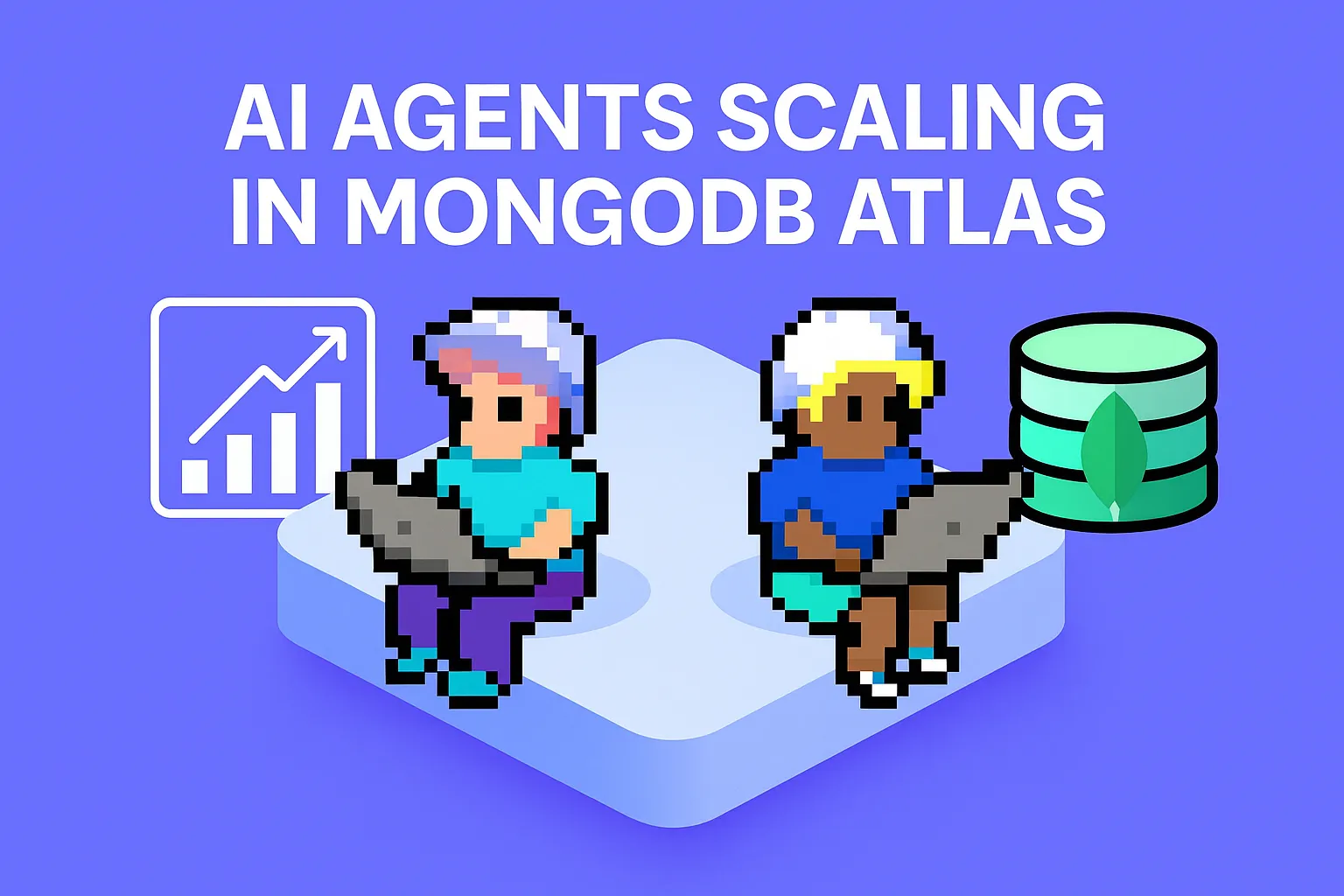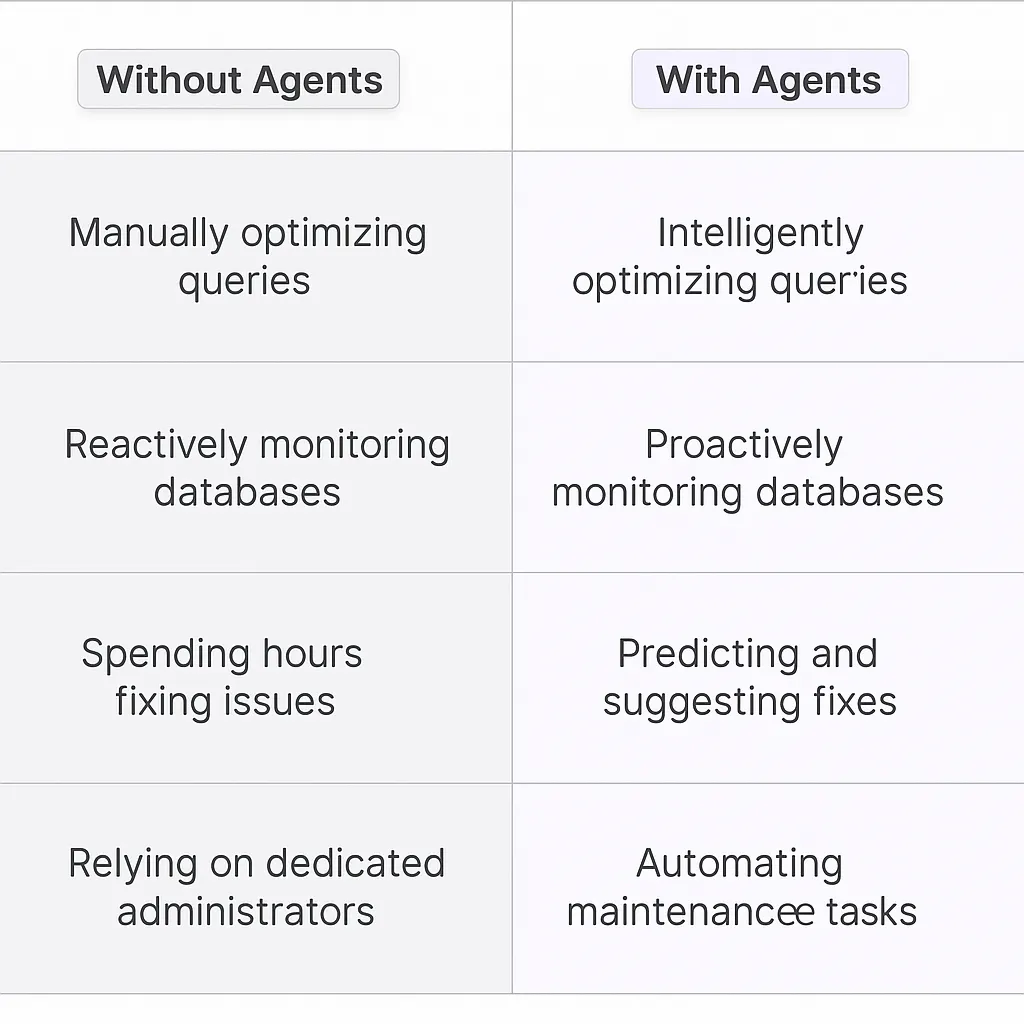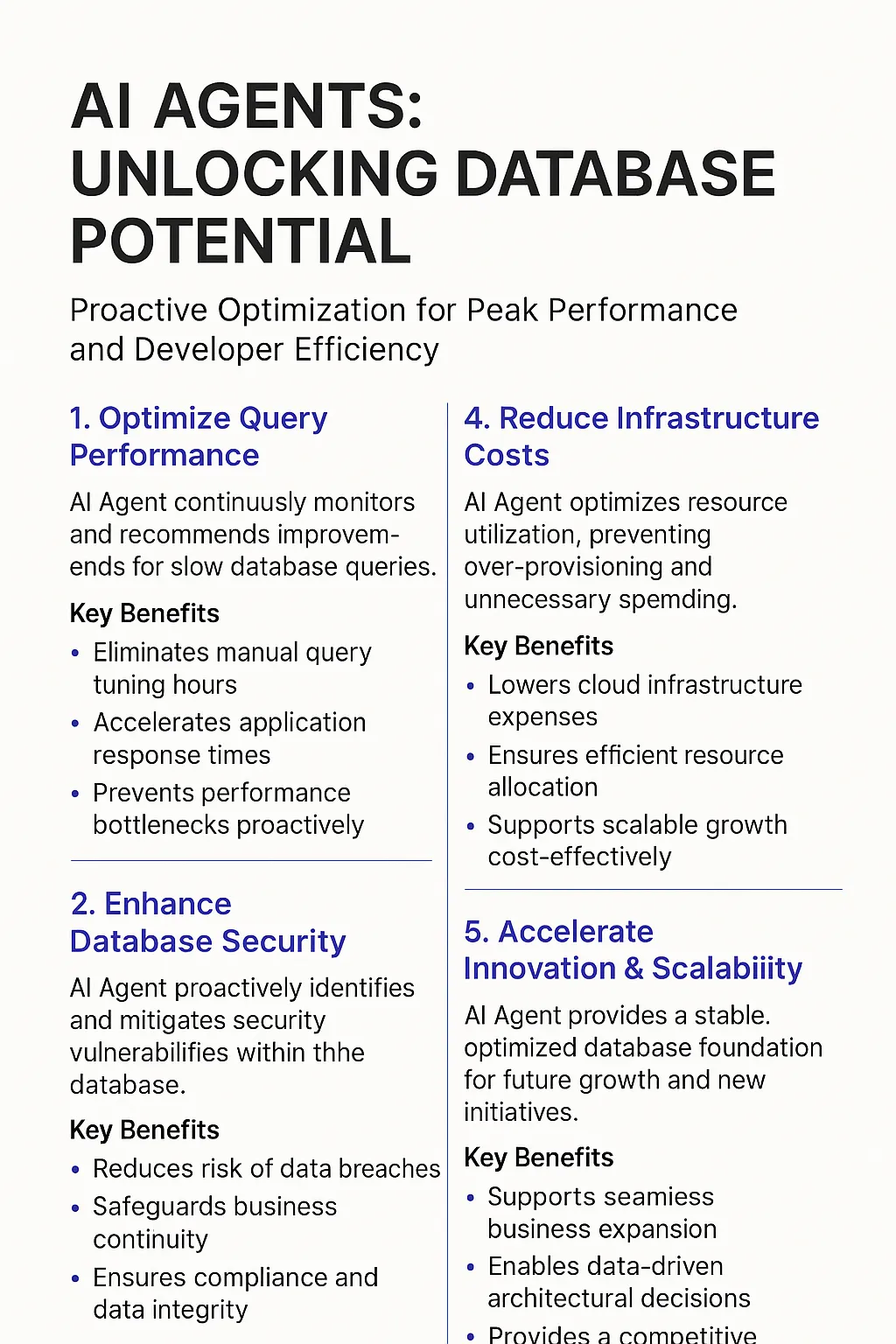MongoDB Atlas
Understanding MongoDB Atlas and Its AI-Powered Evolution
What is MongoDB Atlas?
MongoDB Atlas is a fully managed cloud database service that handles complex operations like scaling, security, and backup management. The platform provides a unified interface for deploying, managing, and scaling MongoDB databases across multiple cloud providers. With the integration of AI Agents, Atlas evolves from a traditional database service into an intelligent data platform that actively participates in optimization and decision-making.
Key Features of MongoDB Atlas
The platform offers automated scaling capabilities, built-in security controls, and global cluster deployment options. Its multi-cloud architecture enables organizations to run databases on AWS, Google Cloud, or Azure. Advanced monitoring tools provide deep insights into database performance, while automated backup solutions ensure data resilience. The integration with AI Agents adds predictive analytics, intelligent optimization, and automated maintenance to these core capabilities.

Benefits of AI Agents for MongoDB Atlas
What would have been used before AI Agents?
MongoDB Atlas users traditionally relied on complex documentation, StackOverflow threads, and database administrators to troubleshoot issues and optimize queries. Teams spent countless hours manually writing and optimizing database queries, reviewing logs, and fine-tuning performance. Database management required deep technical expertise and constant monitoring of metrics, indexes, and query patterns.
What are the benefits of AI Agents?
AI Agents transform MongoDB Atlas operations by functioning as specialized database experts that never sleep. They analyze query patterns in real-time, detecting potential performance bottlenecks before they impact applications. When developers need to optimize a complex aggregation pipeline, the AI Agent can suggest specific index improvements and query rewrites based on actual usage patterns.
The most compelling advantage is how AI Agents bridge the knowledge gap for teams working with MongoDB Atlas. Rather than spending hours researching syntax or best practices, developers can have natural conversations about their database needs. The AI Agent translates these discussions into precise technical implementations while explaining the reasoning behind each recommendation.
For database maintenance, AI Agents continuously monitor cluster health, suggesting proactive optimizations like sharding strategies or resource allocation adjustments. They analyze workload patterns across different times of day, helping teams make data-driven decisions about scaling and architecture.
Security and compliance become more manageable as AI Agents track access patterns and flag potential vulnerabilities. They can suggest role-based access control improvements and help implement security best practices specific to each organization's needs.
The network effects are particularly powerful - as more teams interact with the AI Agent, it builds a deeper understanding of common MongoDB Atlas challenges and solutions, becoming increasingly effective at suggesting optimizations that worked in similar scenarios.

Potential Use Cases of AI Agents with MongoDB Atlas
Database Management and Optimization
MongoDB Atlas AI agents transform how teams handle database operations. These digital teammates monitor performance metrics, identify bottlenecks, and suggest specific index optimizations. When query performance drops, the AI agent analyzes execution plans and recommends concrete schema improvements - like adding compound indexes or restructuring document patterns.
Data Migration and ETL
Moving data between systems becomes significantly more manageable with AI agents that understand MongoDB's document model. They can automatically map fields, validate data types, and handle schema evolution during migrations. The agents detect anomalies in real-time and adjust transformation rules to maintain data integrity.
Query Optimization
AI agents excel at analyzing query patterns and suggesting optimizations. They examine slow-running queries, propose alternative approaches, and generate optimized aggregation pipelines. The agents can even predict when certain queries might cause performance issues based on data growth patterns.
Security and Access Control
MongoDB Atlas AI agents strengthen security postures by continuously monitoring access patterns and identifying potential vulnerabilities. They detect unusual query patterns that might indicate security risks and recommend role-based access control adjustments to maintain least-privilege principles.
Schema Design and Evolution
As applications evolve, AI agents help manage schema changes by analyzing document structures and usage patterns. They identify opportunities for embedding versus referencing, suggest index strategies for new access patterns, and help prevent schema bloat.
Capacity Planning
AI agents analyze resource utilization trends and provide data-driven scaling recommendations. They predict storage needs, memory requirements, and computational demands based on historical patterns and growth trajectories. This helps teams make proactive infrastructure decisions rather than reactive ones.
Development Support
During development cycles, AI agents assist by generating sample queries, explaining complex aggregations, and troubleshooting connection issues. They can suggest best practices specific to the application's data model and usage patterns, accelerating the development process.
Performance Monitoring
AI agents serve as vigilant performance monitors, tracking key metrics and alerting teams to potential issues before they impact users. They analyze patterns in response times, resource utilization, and query execution to maintain optimal database performance.
These use cases demonstrate how MongoDB Atlas AI agents function as specialized digital teammates, combining deep database expertise with real-time analysis capabilities to enhance database operations and development workflows.

Industry Use Cases
MongoDB Atlas AI agents are transforming how different sectors handle their data operations and database management. The real power lies in how these digital teammates adapt to specific industry needs - from healthcare providers managing patient records to fintech companies processing millions of transactions.
What makes these AI agents particularly compelling is their ability to bridge the gap between complex database operations and business outcomes. They're not just executing queries - they're actively participating in data-driven decision making across multiple sectors. The pattern I've observed while working with growing companies is that MongoDB Atlas AI agents become increasingly valuable as data complexity grows.
Looking at actual implementations, we're seeing organizations move beyond basic database management into sophisticated data orchestration. Financial services firms are using these AI agents to maintain data consistency across trading platforms, while e-commerce companies deploy them to manage inventory data across multiple regions. Each industry brings its own unique data challenges, and these digital teammates are proving remarkably adaptible in addressing them.
The following industry examples demonstrate how MongoDB Atlas AI agents are being deployed in real-world scenarios, showcasing their impact on different business models and operational frameworks.
Gaming Industry: MongoDB Atlas AI Agents Transform Player Experiences
Gaming studios face intense pressure to deliver personalized, data-driven experiences while managing massive player databases. MongoDB Atlas AI Agents address this challenge by intelligently processing player behavior data and automating critical database operations.
Take a multiplayer battle royale game with 10 million active players. The AI Agent continuously monitors match data, player statistics, and in-game economies - tasks that would overwhelm even large developer teams. When player counts spike during special events, the Agent automatically scales database resources and optimizes query performance to maintain smooth gameplay.
The real power emerges in how these AI Agents enhance player experiences. By analyzing patterns in player progression, purchase history, and social interactions, the Agent can identify early signs of player churn. It then triggers targeted database operations to adjust difficulty curves, matchmaking parameters, and reward distributions - all without manual intervention.
For game economy balance, MongoDB Atlas AI Agents detect unusual trading patterns or currency fluctuations that could indicate exploits. The Agent automatically implements defensive measures like transaction limits while alerting developers with detailed analytics. This proactive approach maintains game integrity and player satisfaction.
The impact on development teams is substantial. Rather than spending hours fine-tuning database queries and monitoring performance metrics, developers can focus on creating new content and features. The AI Agent handles the complex data management tasks that traditionally consumed 30-40% of development resources.
This shift represents a fundamental evolution in how gaming companies manage player data and server operations. MongoDB Atlas AI Agents don't just automate tasks - they create new possibilities for dynamic, data-driven gaming experiences that adapt in real-time to player behavior.
Healthcare: MongoDB Atlas AI Agents Transform Patient Care Analytics
Healthcare organizations manage petabytes of complex patient data while navigating strict compliance requirements. MongoDB Atlas AI Agents are transforming how medical institutions handle this massive data responsibility through intelligent automation and predictive capabilities.
A major hospital network managing records for 2 million patients demonstrates the transformative impact. The AI Agent continuously monitors patient data flows, lab results, and electronic health records - automatically structuring and indexing information for optimal retrieval. When emergency departments experience high volumes, the Agent dynamically adjusts database resources to maintain sub-second access to critical patient information.
The sophisticated pattern recognition capabilities enable proactive patient care. By analyzing correlations between vital signs, medication records, and treatment outcomes, the Agent identifies potential complications before they become critical. It automatically triggers database operations to surface relevant case histories and treatment protocols to medical staff.
For pharmaceutical research teams, MongoDB Atlas AI Agents monitor trial data and participant responses in real-time. The Agent detects statistical anomalies that could indicate adverse reactions or promising treatment effects, while maintaining HIPAA compliance through automated data encryption and access controls.
Medical staff productivity sees remarkable gains. Instead of wrestling with complex database queries and compliance documentation, healthcare providers can focus on patient care. The AI Agent manages data validation, audit trails, and regulatory reporting that traditionally consumed 25-35% of administrative resources.
This evolution in healthcare data management points to a future where AI Agents serve as digital guardians of patient information. They don't just organize data - they actively contribute to better patient outcomes through intelligent data operations and predictive insights.
Considerations and Challenges
Implementing MongoDB Atlas AI Agents requires careful planning and understanding of several key technical and operational factors. The integration process demands both database expertise and AI implementation knowledge to achieve optimal results.
Technical Challenges
Data schema complexity poses a significant hurdle when setting up MongoDB Atlas AI Agents. The agent needs to understand and navigate various data structures, relationships, and nested documents typical in MongoDB implementations. Organizations often struggle with training the agent to handle complex aggregation pipelines and optimize query performance across sharded clusters.
Security configurations present another layer of complexity. The AI agent requires specific permissions and access controls, while maintaining compliance with data governance policies. Setting up proper authentication mechanisms and managing API keys across different environments demands careful consideration.
Operational Challenges
Resource allocation becomes critical as AI agents interact with MongoDB Atlas. Teams need to monitor and adjust memory usage, CPU utilization, and network bandwidth to prevent performance degradation. The agent's continuous learning process can impact database performance, requiring careful capacity planning.
Change management across development teams presents unique challenges. Developers and database administrators need new skills to effectively work with AI-enhanced database operations. Organizations must invest in training and documentation to ensure smooth adoption and prevent operational disruptions.
Cost management requires ongoing attention. While MongoDB Atlas AI Agents can improve efficiency, organizations need to balance the benefits against increased computational costs. This includes monitoring usage patterns, optimizing agent interactions, and setting up cost alerts to prevent unexpected expenses.
Integration Considerations
Existing workflows and applications need careful evaluation before introducing AI agents. Teams must assess compatibility with current tools, identify potential breaking changes, and plan for graceful degradation if the AI service experiences issues. Creating robust fallback mechanisms and monitoring systems helps maintain system reliability.
Version control and testing strategies need adaptation to include AI agent configurations and behaviors. Teams should establish clear processes for testing agent responses, managing model versions, and tracking performance metrics across different environments.
The Future of Intelligent Database Management
MongoDB Atlas AI Agents mark a fundamental shift in database management philosophy. By combining deep learning capabilities with database expertise, these digital teammates transform how organizations handle data operations. The technology's impact spans across industries, from enabling real-time gaming experiences to enhancing patient care in healthcare settings. As data complexity continues to grow, the role of AI Agents in database management will become increasingly central to operational success. Organizations that embrace this technology gain not just efficiency improvements, but a competitive advantage in their ability to leverage data effectively.













